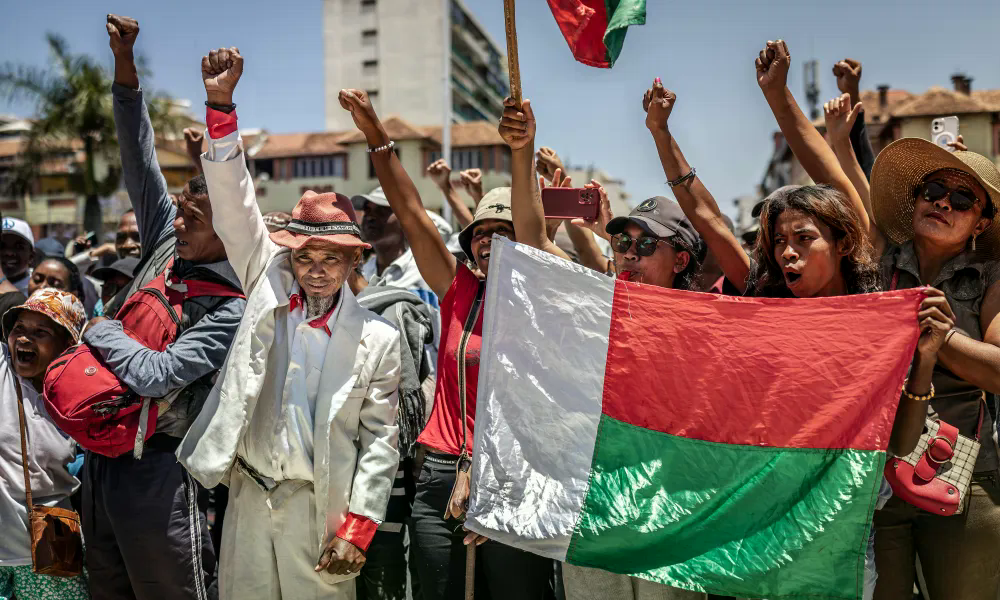
A Madagascar army colonel has declared that the military has assumed control of the country after parliament voted to impeach President Andry Rajoelina. This development followed weeks of youth-led antigovernment protests, which escalated into a constitutional crisis.
In Antananarivo, the capital, citizens celebrated the announcement by Colonel Michael Randrianirina, who stated that the military had taken power. He emphasized that the military would dissolve all institutions except the lower house of parliament. The colonel also announced that a military-led committee would govern alongside a transitional government for up to two years before organizing new elections.
“The renovation period will last a maximum of two years,” Randrianirina said. “During this time, a referendum will be held to establish a new constitution, followed by elections to gradually set up the new institutions.” A statement from military leaders confirmed that several key institutions, including the Senate and the High Constitutional Court, were suspended.
Rajoelina, whose current location is unknown, had previously attempted to dissolve the lower house of parliament by decree. However, lawmakers proceeded with the impeachment vote, resulting in a constitutional deadlock that the military capitalized on to assert control.
The president’s office denounced the military’s actions as “a clear act of attempted coup d’etat.” It claimed that Rajoelina remained in office and was maintaining constitutional order and national stability.
Al Jazeera reporter Fahmida Miller, stationed at the army headquarters, noted that crowds in Antananarivo welcomed the military takeover with cheers and enthusiasm. She reported that no significant opposition to the military’s declaration had been observed so far.
Rajoelina had faced mounting pressure to resign throughout the protests, which were initially driven by frustrations over water and power outages. The demonstrations later expanded to include broader concerns about the cost of living, poverty, and alleged government corruption. A pivotal moment occurred when an elite military unit joined the protesters, turning against the president and prompting him to flee the country.
In a social media address, Rajoelina claimed he had left the country for his safety and was in a “safe space.” A military source told Reuters that he departed on a French military aircraft, though French President Emmanuel Macron did not confirm the involvement of his government.
Hours after Rajoelina accused the military of attempting to seize power illegally, the CAPSAT unit, which played a key role in the 2009 coup that brought Rajoelina to power, announced it had taken control of the military. The unit had previously refused orders to shoot at demonstrators.
On Tuesday, a local news website reported that police and gendarmerie had also aligned with the protests. The antigovernment movement, led by Gen Z groups, began in September 2024, initially protesting service disruptions but evolving into a broader call for political change.
Rajoelina, who once positioned himself as a reformist, led a transitional government until 2014 and returned to power after winning the 2019 election. He secured a second full term in 2023.
The United Nations reported at least 22 deaths and over 100 injuries since the protests began, although Rajoelina’s government disputed these figures. A CAPSAT soldier died during clashes with the gendarmerie on Saturday, marking a turning point in the security forces’ alignment with the demonstrations.
The protests have highlighted deep-seated frustrations in Madagascar, one of the world’s poorest nations, where only a third of the population has access to electricity, and blackouts frequently exceed eight hours daily. The Gen Z Madagascar movement has drawn inspiration from similar youth-led uprisings in countries such as Kenya, Indonesia, and Peru, and has contributed to the ousting of governments in Bangladesh, Nepal, and Sri Lanka.
Despite repeated efforts by Rajoelina’s administration to engage in dialogue, the Gen Z movement has consistently rejected government offers for negotiation.


